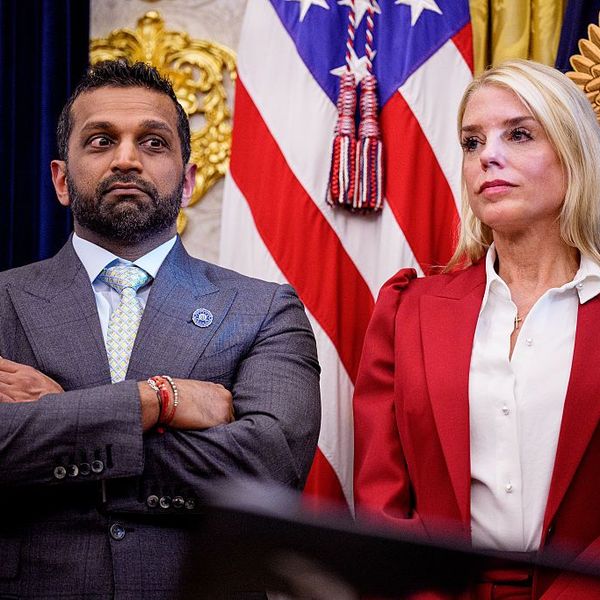'Justice is Priceless': DOJ Sues Ferguson Over Refusal to Change Discriminatory Policies
'Residents of Ferguson...have waited decades for justice. They should not be forced to wait any longer.'
The U.S. Department of Justice (DOJ) on Wednesday filed a civil lawsuit against Ferguson, Missouri, less than a day after the city rejected an agreement to reform its discriminatory criminal justice system.
Ferguson's black residents still face "ongoing and pervasive" civil rights violations, largely stemming from the city's continued use of law enforcement to generate revenue, according to the lawsuit, filed by the DOJ's Civil Rights Division in the U.S. District Court for the Eastern District of Missouri.
Federal and local officials spent months negotiating a consent decree that would have prohibited police officers from making arrests without probable cause or using tasers as punishment, among other stipulations, but the Ferguson City Council unanimously rejected the final agreement on Tuesday over its cost--despite the DOJ's earlier warnings that it would respond to such a move with a lawsuit.
"Residents of Ferguson have suffered the deprivation of their constitutional rights--the rights guaranteed to all Americans--for decades," Attorney General Loretta Lynch said Wednesday. "They have waited decades for justice. They should not be forced to wait any longer."
Brittany Packnett, a prominent organizer with the Black Lives Matter movement, on Wednesday tweeted that the DOJ's Civil Rights Division is "one of the only gov't institutions to have kept its promise to Ferguson. They are playing no games. Thank you."
Ferguson's city council voted Tuesday that they would only accept the agreement if it made seven changes, including getting rid of a provision that would have required the city to abide by the deal even if it dissolved its police department and handed law enforcement duties to an outside agency.
At a public hearing Tuesday, council members said the decree was too expensive to undertake. The DOJ countered that the agreement included stipulations that capped fees and provided free federal aid, while activists said, "Justice is priceless."
DOJ Principal Deputy Assistant Attorney General Vanita Gupta, who heads the department's Civil Rights Division, said Wednesday, "The Ferguson City Council has attempted to unilaterally amend the negotiated agreement. Their vote to do so creates an unnecessary delay in the essential work to bring constitutional policing to the city, and marks an unfortunate outcome for concerned community members and Ferguson police officers."
Jamira Burley, senior campaigner with Amnesty International USA, said in a statement, "This lawsuit sends a strong message that discrimination and other abuses by the Ferguson Police Department will not be tolerated."
Following the 2014 shooting of unarmed teenager Michael Brown, and the subsequent non-indictment of the officer who killed him, the DOJ conducted a months-long investigation into Ferguson's criminal justice system, concluding in March 2015 that it was broken at every level and created a culture of "racial animosity" in the St. Louis suburb.
Wednesday's lawsuit echoed much of those findings, stating that the city's use of law enforcement to raise revenue is the reason it never attempted to "decrease or eliminate police misconduct, including discriminatory policing, unconstitutional stops, searches and arrests, and the use of unreasonable force."
Lynch said Wednesday that the response to Brown's shooting "uncovered a community in distress, in which residents felt under assault by their own police force." The violations were "expansive and deliberate," she said. "They were not only egregious--they were routine."
"We intend to aggressively prosecute this case and I have no doubt that we will prevail," Lynch said.
An Urgent Message From Our Co-Founder
Dear Common Dreams reader, The U.S. is on a fast track to authoritarianism like nothing I've ever seen. Meanwhile, corporate news outlets are utterly capitulating to Trump, twisting their coverage to avoid drawing his ire while lining up to stuff cash in his pockets. That's why I believe that Common Dreams is doing the best and most consequential reporting that we've ever done. Our small but mighty team is a progressive reporting powerhouse, covering the news every day that the corporate media never will. Our mission has always been simple: To inform. To inspire. And to ignite change for the common good. Now here's the key piece that I want all our readers to understand: None of this would be possible without your financial support. That's not just some fundraising cliche. It's the absolute and literal truth. We don't accept corporate advertising and never will. We don't have a paywall because we don't think people should be blocked from critical news based on their ability to pay. Everything we do is funded by the donations of readers like you. Will you donate now to help power the nonprofit, independent reporting of Common Dreams? Thank you for being a vital member of our community. Together, we can keep independent journalism alive when it’s needed most. - Craig Brown, Co-founder |
The U.S. Department of Justice (DOJ) on Wednesday filed a civil lawsuit against Ferguson, Missouri, less than a day after the city rejected an agreement to reform its discriminatory criminal justice system.
Ferguson's black residents still face "ongoing and pervasive" civil rights violations, largely stemming from the city's continued use of law enforcement to generate revenue, according to the lawsuit, filed by the DOJ's Civil Rights Division in the U.S. District Court for the Eastern District of Missouri.
Federal and local officials spent months negotiating a consent decree that would have prohibited police officers from making arrests without probable cause or using tasers as punishment, among other stipulations, but the Ferguson City Council unanimously rejected the final agreement on Tuesday over its cost--despite the DOJ's earlier warnings that it would respond to such a move with a lawsuit.
"Residents of Ferguson have suffered the deprivation of their constitutional rights--the rights guaranteed to all Americans--for decades," Attorney General Loretta Lynch said Wednesday. "They have waited decades for justice. They should not be forced to wait any longer."
Brittany Packnett, a prominent organizer with the Black Lives Matter movement, on Wednesday tweeted that the DOJ's Civil Rights Division is "one of the only gov't institutions to have kept its promise to Ferguson. They are playing no games. Thank you."
Ferguson's city council voted Tuesday that they would only accept the agreement if it made seven changes, including getting rid of a provision that would have required the city to abide by the deal even if it dissolved its police department and handed law enforcement duties to an outside agency.
At a public hearing Tuesday, council members said the decree was too expensive to undertake. The DOJ countered that the agreement included stipulations that capped fees and provided free federal aid, while activists said, "Justice is priceless."
DOJ Principal Deputy Assistant Attorney General Vanita Gupta, who heads the department's Civil Rights Division, said Wednesday, "The Ferguson City Council has attempted to unilaterally amend the negotiated agreement. Their vote to do so creates an unnecessary delay in the essential work to bring constitutional policing to the city, and marks an unfortunate outcome for concerned community members and Ferguson police officers."
Jamira Burley, senior campaigner with Amnesty International USA, said in a statement, "This lawsuit sends a strong message that discrimination and other abuses by the Ferguson Police Department will not be tolerated."
Following the 2014 shooting of unarmed teenager Michael Brown, and the subsequent non-indictment of the officer who killed him, the DOJ conducted a months-long investigation into Ferguson's criminal justice system, concluding in March 2015 that it was broken at every level and created a culture of "racial animosity" in the St. Louis suburb.
Wednesday's lawsuit echoed much of those findings, stating that the city's use of law enforcement to raise revenue is the reason it never attempted to "decrease or eliminate police misconduct, including discriminatory policing, unconstitutional stops, searches and arrests, and the use of unreasonable force."
Lynch said Wednesday that the response to Brown's shooting "uncovered a community in distress, in which residents felt under assault by their own police force." The violations were "expansive and deliberate," she said. "They were not only egregious--they were routine."
"We intend to aggressively prosecute this case and I have no doubt that we will prevail," Lynch said.
The U.S. Department of Justice (DOJ) on Wednesday filed a civil lawsuit against Ferguson, Missouri, less than a day after the city rejected an agreement to reform its discriminatory criminal justice system.
Ferguson's black residents still face "ongoing and pervasive" civil rights violations, largely stemming from the city's continued use of law enforcement to generate revenue, according to the lawsuit, filed by the DOJ's Civil Rights Division in the U.S. District Court for the Eastern District of Missouri.
Federal and local officials spent months negotiating a consent decree that would have prohibited police officers from making arrests without probable cause or using tasers as punishment, among other stipulations, but the Ferguson City Council unanimously rejected the final agreement on Tuesday over its cost--despite the DOJ's earlier warnings that it would respond to such a move with a lawsuit.
"Residents of Ferguson have suffered the deprivation of their constitutional rights--the rights guaranteed to all Americans--for decades," Attorney General Loretta Lynch said Wednesday. "They have waited decades for justice. They should not be forced to wait any longer."
Brittany Packnett, a prominent organizer with the Black Lives Matter movement, on Wednesday tweeted that the DOJ's Civil Rights Division is "one of the only gov't institutions to have kept its promise to Ferguson. They are playing no games. Thank you."
Ferguson's city council voted Tuesday that they would only accept the agreement if it made seven changes, including getting rid of a provision that would have required the city to abide by the deal even if it dissolved its police department and handed law enforcement duties to an outside agency.
At a public hearing Tuesday, council members said the decree was too expensive to undertake. The DOJ countered that the agreement included stipulations that capped fees and provided free federal aid, while activists said, "Justice is priceless."
DOJ Principal Deputy Assistant Attorney General Vanita Gupta, who heads the department's Civil Rights Division, said Wednesday, "The Ferguson City Council has attempted to unilaterally amend the negotiated agreement. Their vote to do so creates an unnecessary delay in the essential work to bring constitutional policing to the city, and marks an unfortunate outcome for concerned community members and Ferguson police officers."
Jamira Burley, senior campaigner with Amnesty International USA, said in a statement, "This lawsuit sends a strong message that discrimination and other abuses by the Ferguson Police Department will not be tolerated."
Following the 2014 shooting of unarmed teenager Michael Brown, and the subsequent non-indictment of the officer who killed him, the DOJ conducted a months-long investigation into Ferguson's criminal justice system, concluding in March 2015 that it was broken at every level and created a culture of "racial animosity" in the St. Louis suburb.
Wednesday's lawsuit echoed much of those findings, stating that the city's use of law enforcement to raise revenue is the reason it never attempted to "decrease or eliminate police misconduct, including discriminatory policing, unconstitutional stops, searches and arrests, and the use of unreasonable force."
Lynch said Wednesday that the response to Brown's shooting "uncovered a community in distress, in which residents felt under assault by their own police force." The violations were "expansive and deliberate," she said. "They were not only egregious--they were routine."
"We intend to aggressively prosecute this case and I have no doubt that we will prevail," Lynch said.

